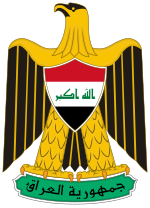
Kirkuk is a city in Iraq, serving as the capital of the Kirkuk Governorate, located 238 kilometres north of Baghdad. The city is home to a diverse population of Kurds, Turkmens and Arabs. Kirkuk sits on the ruins of the original Kirkuk Citadel which sits near the Khasa River.

Kirkuk Governorate or Kirkuk Province is a governorate in northern Iraq. The governorate has an area of 9,679 square kilometres (3,737 sq mi). In 2017, the estimated population was 1,259,561 people. The provincial capital is the city of Kirkuk. It is divided into four districts.

The Iraq Petroleum Company (IPC), formerly known as the Turkish Petroleum Company (TPC), is an oil company that had a virtual monopoly on all oil exploration and production in Iraq between 1925 and 1961. It is jointly owned by some of the world's largest oil companies and headquartered in London, England. However, today it is only a paper entity with historical rights and plays no part in the modern development of Middle Eastern oil.
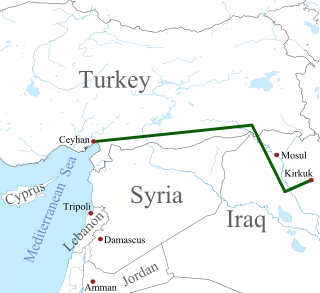
The Kirkuk–Ceyhan Oil Pipeline, also known as the Iraq–Turkey Crude Oil Pipeline, is a 600-mile-long (970 km) pipeline that runs from Kirkuk in Iraq to Ceyhan in Turkey. It is Iraq's largest crude oil export line.
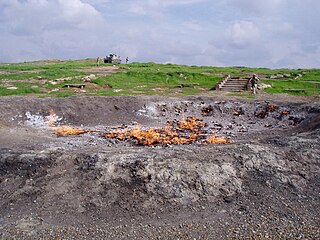
Baba Gurgur is an oil field and gas flame near the city of Kirkuk, which was the first to be discovered in Northern Iraq in 1927.
The Iraq National Oil Company (INOC) was founded in 1966 by the Iraqi government. It was empowered to operate all aspects of the oil industry in Iraq except for refining which was already being run by the Oil Refineries Administration (1952) and local distribution which was also already under government control.
The 2007 Kirkuk bombings were a series of 3 suicide and car bomb attacks that occurred on July 16, 2007, in the northern Iraqi oil city of Kirkuk. The bombing killed 86 people with up to 180 injured.
Kirkuk Field is an oilfield in Kirkuk, Iraq. It was discovered by the Turkish Petroleum Company at Baba Gurgur in 1927. The oilfield was brought into production by the Iraq Petroleum Company (IPC) in 1934 when the 12-inch pipelines from Kirkuk to Haifa and Tripoli were completed. It has ever since remained the most important part of northern Iraqi oil production with over 10 billion barrels of proven remaining oil reserves in 1998. After about seven decades of operation, Kirkuk still produces up to 1 million barrels per day, almost half of all Iraqi oil exports. Oil from the Kirkuk oilfield is now exported through the Kirkuk-Ceyhan Oil Pipeline, which runs to the Turkish port of Ceyhan on the Mediterranean Sea.
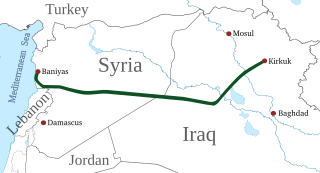
The Kirkuk–Baniyas pipeline is a currently defunct crude oil pipeline from the Kirkuk oil field in Iraq to the Syrian port of Baniyas. The pipeline went into operation in April 1952 and was formally opened in November.
The Ministry of Oil is the Iraqi government agency responsible for Iraqi petroleum. The Minister of Oil since October 2022 is Hayyan Abdul Ghani.

The Kirkuk–Haifa oil pipeline was a crude oil pipeline from the oil fields in Kirkuk, located in the former Ottoman vilayet of Mosul in northern Iraq, through Transjordan to Haifa in mandatory Palestine. The pipeline was operational between 1935 and 1948. Its length was about 942 kilometres (585 mi), with a diameter of 12 inches (300 mm), and it took about 10 days for crude oil to travel the full length of the line. The oil arriving in Haifa was distilled in the Haifa refineries, stored in tanks, and then put in tankers for shipment to Europe.

The disputed territories of northern Iraq are regions defined by article 140 of the Constitution of Iraq as being Arabised during Baath Party rule in Iraq. Most of these regions are inhabited by non-Arabs, including Kurds, Assyrians, Yazidis, Turkmens/Turkomans, and Shabaks.

Iraq was the world's 5th largest oil producer in 2009, and has the world's fifth largest proven petroleum reserves. Just a fraction of Iraq's known fields are in development, and Iraq may be one of the few places left where vast reserves, proven and unknown, have barely been exploited. Iraq's energy sector is heavily based upon oil, with approximately 94 percent of its energy needs met with petroleum. In addition, crude oil export revenues accounted for over two-thirds of GDP in 2009. Iraq's oil sector has suffered over the past several decades from sanctions and wars, and its oil infrastructure is in need of modernization and investment. As of June 30, 2010, the United States had allocated US$2.05 billion to the Iraqi oil and gas sector to begin this modernization, but ended its direct involvement as of the first quarter of 2008. According to reports by various U.S. government agencies, multilateral institutions and other international organizations, long-term Iraq reconstruction costs could reach $100 billion (US) or higher.
The Ba'athist Arabization campaigns in northern Iraq were part of a large-scale effort in demographic engineering undertaken by the erstwhile Iraqi government, which had aimed to shift the country's population in a way that would render non-Arabs subjugated under Arab hegemony. While comprising the ethnic majority on a national scale, the Arab population is a regional minority in northern Iraq; this region of the country is where Iraqi ethnic minorities are concentrated. In order to Arabize the north, the government adopted a policy in line with settler colonialism, allotting land in the north to Arab settlers. The campaigns also involved ethnic cleansing, primarily targeting Kurds, but also Turkmen, Yazidis, Assyrians, Shabaks, Mandaeans, and Armenians, among others. In 1978 and 1979, 600 Kurdish villages were burned down and around 200,000 Kurds were deported to other parts of Iraq.

The Battle of Kirkuk was a battle in the city of Kirkuk in northern Iraq between Iraqi Kurdistan and the Islamic State of Iraq and the Levant. On the night of January 29, around 150 ISIL fighters attacked positions south and west of the city of Kirkuk, Iraq, which were temporarily under the control of the Peshmerga. The ISIL offensive began under the cover of dense fog and succeeded in overwhelming Peshmerga positions and seizing the towns of Mala Abdullah, Maryam Beg, Tel Ward and the Maktab Khalid crossing. Parts of the Khabbaz oil fields were also captured, taking 24 workers hostage. At least 25 Peshmerga fighters died including Brig. Gen. Sherko Shwani, commander of the 1st Brigade and the highest ranking head of Peshmerga forces in Kirkuk. Gen. Sherko Shwani was killed after being trapped and shot by attackers, according to another Peshmerga commander. Around 16 other Peshmerga fighters were captured by ISIL, and later killed in a staged execution.

The Battle of Kirkuk (2017), part of the 2017 Iraqi–Kurdish conflict, was a military deployment by the Iraqi Security Forces to retake Kirkuk Governorate from the Peshmerga after the latter ignored repeated warnings to withdraw, sparking clashes between the two forces. The advance began on 15 October 2017, with the city of Kirkuk being retaken the following day. Iraqi central government forces continued their advances in subsequent days, routing the Peshmerga forces across vast swathes of territory in northern Iraq.

The 2017 Iraqi–Kurdish conflict, also known as the Kirkuk crisis, was a conflict in which the Iraqi government retook disputed territories in Iraq which had been held by the Peshmerga since ISIL's Northern Iraq offensive in 2014. The conflict began on 15 October 2017 after tensions arising from the Kurdistan Region independence referendum of 25 September. The tension between the federal Iraqi government and Kurdistan Region escalated into conflict when the Peshmerga ignored repeated warnings to return Kirkuk to Iraqi government forces. Part of the conflict was the Battle of Kirkuk, when Iraqi forces routed Peshmerga forces from the city in a surprise dawn-offensive, marking the beginning of clashes.
Iraq's large oil reserves have attracted attention from the United Kingdom, a country with a high demand for oil. British involvement in the Iraqi oil industry dates to World War I. Political influence in the region has given the UK the power to establish a number of oil companies in Iraq.

The Islamic State insurgency in Iraq is an ongoing low-intensity insurgency that began in 2017 after the Islamic State (ISIS) lost its territorial control in the War in Iraq, during which ISIS and allied White Flags fought the Iraqi military and allied paramilitary forces.
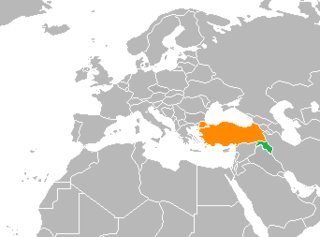
Turkey’s historic relationship with Iraq and Kurdistan Region has wavered between indifference and courtship, but the constant has been a layer of mistrust emanating from both ends that appears to have been set aside in 2001 when the new Turkish government reversed the status quo and embraced a policy of engagement that has successfully catapulted the country to becoming a leading economic player in the Middle East.
